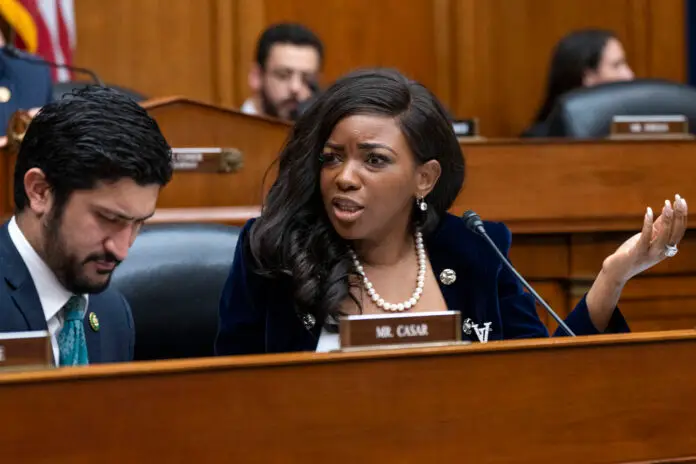
In a moment that has left many Americans shaken, Democratic Congresswoman Jasmine Crockett of Texas is defending her use of explosive political language just days after the tragic assassination of conservative commentator Charlie Kirk.
During a recent interview on The Breakfast Club, Crockett compared former President Donald Trump to Adolf Hitler — a statement that has drawn both fierce criticism and passionate support. In an era where political violence in America feels like it’s no longer a distant threat but a chilling reality, Crockett insists her words reflect raw honesty, not an incitement to harm.
But with emotions running high and tensions growing even deeper between the political left and right, many are asking: Are our leaders doing enough to cool things down — or are they pouring fuel on the fire?
A Nation on Edge: Political Anger Boils Over
The nation was already on edge following the shocking news that Charlie Kirk, a prominent conservative voice, had been gunned down in Utah by a suspected left-wing extremist. The assassination sent shockwaves across the country, especially among older Americans who’ve lived through times of division — but perhaps not like this.
Only days later, Rep. Crockett made her controversial Hitler comparison. While she was careful to say her words were not a direct call for violence, critics say they reflect a dangerous new normal in American discourse — where name-calling, outrage, and demonization have become more common than calm debate.
Still, Crockett stands firm. In her eyes, Trump’s own behavior — from joking about shooting people to encouraging violence at rallies — has opened the door to this toxic environment. To her, calling out what she sees as dangerous behavior isn’t just rhetoric — it’s a moral obligation.
“I didn’t say what I said lightly,” Crockett explained. “But I’m not going to pretend this isn’t serious. People are angry, and we should be.”
From Political Disagreement to Dangerous Division
It’s no secret that political rhetoric has grown more intense in recent years. But many Americans — especially seniors who’ve watched the country evolve over decades — are now wondering whether things have gone too far.
Across the political spectrum, there’s growing concern about how public figures speak about each other. When politicians are compared to dictators or labeled as threats to humanity, critics warn that it dehumanizes the opposition. And when people are no longer seen as fellow Americans, but as enemies, the line between speech and action can blur.
We’ve seen this before. From violent protests to assassination attempts, the line between politics and violence is starting to feel dangerously thin.
And while Crockett may feel justified in her outrage, others worry that the Democratic Party — especially its more progressive voices — are escalating the fight instead of helping to heal the divide.
Critics Sound the Alarm: “This Is a Dangerous Road”
Political commentators on both sides are voicing concern. While Crockett and her supporters believe her language is bold but necessary, others fear it crosses into a space that fosters hatred.
They point to past incidents — like President Joe Biden joking about fighting Trump “behind the gym” — as more than just harmless quips. These moments, they argue, help build a culture where violence becomes thinkable.
“Words matter,” said one retired federal judge. “When people in power speak with hostility, it gives others permission to act on their worst instincts.”
And tragically, we’ve already seen the results of that. The attack on Charlie Kirk didn’t happen in a vacuum. It followed years of political escalation, online echo chambers, and leaders who sometimes seem more interested in scoring points than calming fears.
Who Was Tyler Robinson? The Suspect Behind the Kirk Assassination
Investigators are still piecing together the background of Tyler Robinson, the man accused of killing Charlie Kirk. Early reports describe him as a young man who grew increasingly radical in his political views over time.
A former friend of Robinson’s revealed that he had always been politically isolated — especially within his conservative family. Over the years, he reportedly became more angry, more extreme, and more willing to lash out. Those close to him say they never imagined it would end in violence — but in hindsight, there were red flags.
For many older Americans, this story is a haunting reminder of how quickly things can spiral — especially when vulnerable individuals are bombarded with extreme messages from media, influencers, and politicians alike.
Trump Responds: A Call for Justice, But Not for Unity?
On Friday, former President Donald Trump confirmed live on Fox & Friends that a suspect had been arrested in connection with Kirk’s assassination.
“I just got the call before I came on,” he said, thanking law enforcement but stopping short of calling for unity. Instead, Trump used the moment to criticize Democrats for what he described as a pattern of political violence and dangerous speech.
And so the cycle continues — outrage followed by more outrage, tragedy followed by finger-pointing. As the investigation continues, one question hangs over everything: How do we stop this before it gets even worse?
Is There a Way Back from the Brink?
Many Americans — especially older adults who’ve seen the best and worst of what this country can be — are yearning for something different. They remember times when neighbors could disagree and still shake hands, when political debates didn’t end with broken friendships or worse.
But those days feel far away.
The rise in political violence, the toxic rhetoric on cable news and social media, the tendency to paint the other side as evil — it’s all creating an atmosphere of fear and hopelessness. And while leaders like Rep. Crockett believe they’re fighting for what’s right, others fear they may be losing sight of what’s at stake.
“I understand why people are angry,” said a retired teacher in Ohio. “But when you call someone Hitler, when you speak like that, it stops being a conversation. It becomes a war.”
Where Do We Go From Here?
Rep. Jasmine Crockett’s fiery defense of her words may resonate with some, especially those who feel unheard or afraid of another Trump presidency. But for many others — particularly older Americans — her comments are a troubling sign of a nation increasingly at war with itself.
At a time when political violence is no longer just a threat but a reality, both parties must take responsibility for the tone they set. Because if we don’t, the next tragedy may be just around the corner — and no amount of justified anger will undo the damage.
We need more than strong words. We need strong leadership. And we need it now.


